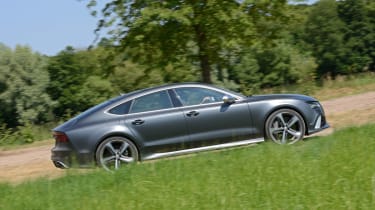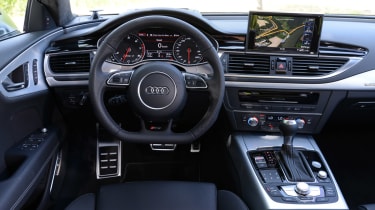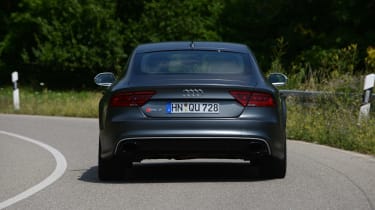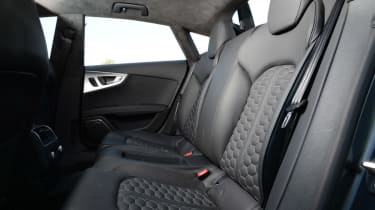Audi RS7 Sportback (2013-2017) review
Flagship Audi RS7 features a sensational engine and a chassis that delivers exceptional all-round ability

The Audi RS 7 Sportback is a close relation to the cultish RS 6 Avant estate. It uses the same 4.0-litre twin-turbocharged V8, features the same eight-speed Tiptronic automatic transmission and quattro four-wheel drive system, and it was also offered with the same Performance Pack for even more power and driver involvement.
One big difference between the RS 7 and a hypothetical RS 6 saloon is that a four-door version of the RS 6 would be cheaper than the estate, but the RS7 is more expensive than the Avant. So, the hatchback body is less practical, but does that make it an irrelevance? No, because it's a classy, upmarket and comfortable high-performance machine that allows four people and their luggage to cruise the continent in comfort.
• Best performance cars on sale
As standard, the RS7 Sportback was a little under £87,000 and cam with a 552bhp 4.0-litre twin-turbo V8. Standard equipment was befitting of a car that stood as the ultimate incarnation of the A7 Sportback. There were 20-inch alloy wheels, LED headlights, MMI Navigation plus, RS Super Sports front seats, a powered tailgate and an electric slide and tilt glass sunroof.
In 2016 Audi introduced the RS 7 Performance. This gave the car an extra 45bhp, while 21-inch alloys, privacy glass, a titanium grey styling pack and sports exhaust helped distinguish it from the standard car. Of course there was a price premium with this car with prices starting at just over £94,000. Now there's a new A7 Sportback on the scene, the RS 7 is no more, so if you're looking at used examples, you'll save at least £30k on those initial prices, and it'll cost less than a similarly specced but more desirable RS 6 Avant in the process.
As the RS 7 Sportback is a bit of a unique machine, there aren't really any direct rivals. The closest will be the Porsche Panamera, but while that car will be more driver-focused, the RS 7 is far better looking. You could consider its RS 6 stablemate, ot there's the Mercedes-AMG options of the E 63 and CLS 63.
Used - available now

2023 Audi
A3 Sportback
19,678 milesManualPetrol1.0L
Cash £17,324
2024 Audi
A3 Sportback
30,795 milesManualPetrol1.5L
Cash £19,750
2024 Audi
A3 Sportback
17,333 milesManualPetrol1.0L
Cash £18,811
2021 Mercedes
A-Class
41,806 milesAutomaticDiesel1.5L
Cash £16,051BMW offers the M5 and M6 in standard coupe and four-door Gran Coupe forms, although neither is as accomplished as the RS 7. Another leftfield choice could be the Nissan GT-R, because while it's a two-door coupe, it has plenty of space inside for four.
Some would argue that the Audi RS7 Sportback is the answer to a question that nobody asked, but that would dismiss it all too readily. There’s no shortage of big four-door GTs with serious performance and price tags to match, but the RS7 is worth considering.
It’s not as fast nor as fun or as adjustable as the latest Mercedes AMG or BMW M saloons, and can’t match them for practicality or cutting-edge tech. The RS7 still has its merits thanks to its quality, comfort and true all-weather pace, but a high price and eye-watering running costs limit its appeal.
Engines, performance and drive
A simple assessment of the numbers shows that the RS7 Performance is more expensive, less powerful and has a smaller boot than rivals like the Mercedes-AMG E 63. But at this level of the market, there’s much more to it and feel can be just as important.
There’s still an incredible level of power on offer from the 4.0-litre twin-turbo V8, while the brand’s famous quattro four-wheel-drive system ensures there’s enough traction to harness all that potential – even if the set-up can’t vary its torque transmission as cleverly as some rivals. A standard Sport differential is fitted on the Audi’s rear axle to help boost agility, although it’s not quite as effective as other electronically controlled diffs.
The RS7 is underpinned by the VW Group’s MLB platform and gets RS-specific adaptive air suspension as standard, although the Audi feels less focused than some rivals, offering more comfort at the expense of some dynamic ability.
The chassis set-up is softer tahn some rivals, and even on large 21-inch wheels the Audi rolls over bumps where rivals tend to get upset. It’s still no super-smooth cruiser, but it offers good long-distance comfort. Turn on to some country lanes and it’s clear the Audi is outclassed by sharper rivals. The engine revs with a bassy rumble through its sports exhaust, popping and banging on downshifts, but the throttle response is snatchy in Dynamic mode and the gearbox jerks going up and down the ratios in manual as if it’s right on the limit of what it can handle.
The steering is corrupted by the presence of a pair of driveshafts at the front, too. There’s little feel and it’s resistant to your inputs, and although there’s plenty of traction, the RS7’s chassis feels heavy and lethargic. Even in the firmest damper setting, it struggles to contain its mass and isn’t very adjustable. It also pitches violently under hard acceleration and braking. Ultimately, the RS7 doesn’t have the control or composure of AMG models, nor the bombastic engine. It’s still fairly fun and ridiculously fast, but the latest AMG models show the pace of progress in the super saloon sector.
Audi offers a number of options that allow you to tailor the driving experience. The Dynamic Package Plus weighs in at just under £11,000, but it adds fade-free ceramic brakes, dynamic steering and sports suspension with dynamic ride control.
This replaces the standard air-suspension with steel springs and three-way adjustable dampers, which are connected diagonally by oil lines and a central valve to help control pitch and roll. Both systems can be controlled via the Drive Select set-up.
Engine
While the chassis doesn't have that last edge for handling, that’s not an argument you could level at the engine. Carried over from the RS6 Avant, the mighty twin-turbo V8 produces between 700 and 750Nm of torque, depending on the model, and from the moment it fires up with a menacing grumble, it’s the undoubted star of the show.
With no launch control, it's down to the driver to match Audi's claimed 0-62mph time of 3.7 seconds for the RS 7 Performance. When we tested it, we managed 0-60mph in 3.9 seconds – still quick, but a couple of tenths down. The slightly hesitant transmission also showed its downside going through the gears between 30 and 70mph.
However, the gearbox is genuinely smooth in auto mode, which makes the RS7 easy to live with.
MPG, CO2 and Running Costs
If you were buying an RS7 new, then serious depreciation was a cause for concern. Our experts predicted the Audi would lose £54,335 in its first three years, retaining just 42.3 per cent of it price. But that does mean you get a lot of car for the money on the used market.
Fixed-price servicing should make it easier to budget for maintenance, but if you use the engine's full potential, you can expect economy figures in the teens at best.
Interior, design and technology
Characterised by its large dimensions and low-slung body, the A7 (on which the RS7 is based) is a classy-looking car that follows Audi’s Russian-doll design approach. It looks most distinctive from the rear, with its tapered tail and retractable spoiler.
The RS7 builds on the standard car’s style with the usual muscular side sills of RS models, while there’s also the option of matt aluminium mirrors. Jewel-like LED headlights are standard, while the arches are filled by standard 20-inch wheels. Go for the Performance model, and you get 21-inch wheels, although they don't spoil the ride as much you would expect. If it's an issue, you can swap to 20-inch wheels for no extra cost. Other updates for the Performance model are dark grey exterior trim, while the cabin gets a soft leather trim upgrade.
• Best executive saloons on sale
Inside, the high-quality switchgear and sleek design of the standard A7 are matched to a smattering of racy RS detailing. Everything about the dashboard is logically laid out and it’s all finished in luxurious materials. But the navigation screen is small, and unless you indulge in the vast options list there’s little to distinguish the cabin from lesser Audis. Options include a £6,300 Bang & Olufsen sound system, plus heat and sound-insulating glass and soft-close doors, and you can easily break the £100,000 price barrier if you're wild with the check boxes.
Sat-nav, stereo and infotainment
Audi’s MMI Nav Plus system takes care of infotainment here, and while it’s easy to navigate, at this price it lacks features such as Apple CarPlay and Android Auto; you’ll have to pay £250 for Audi’s Smartphone Interface. Connected services also cost £750 for three years.
The eight-inch colour display is nowhere near as impressive as newer widescreen units in rivals, and its graphics aren’t as sharp, either. Audi’s 12.3-inch Virtual Cockpit digital dash display is conspicuous by its absence as well, highlighting the RS7’s age.
However, you get DAB, Bluetooth and online map updates, as well as a seven-inch colour display in between the rev counter and speedo giving trip, nav, phone and radio info. This is where the £1,510 Night vision assistant picture is displayed if you spec it.
There's also a Bang & Olufsen Advanced Sound system, although at £6,300, it’s a seriously pricey extra that won't have added any value to a used RS7.
Practicality, comfort and boot space
The electrically operated hatch tailgate makes it easy to access the RS7’s vast load bay, and at 535 litres, the boot is 75 litres bigger than you'll find in a BMW M6. This turns into a very handy 1,390-litre space with the rear seats folded flat.
There are a pair of sculpted rear seats in the back with decent legroom, and there’s enough room for adults to sit in relative comfort in the back. Visibility isn’t great, though, so it’s worth paying extra for the £400 rear-view camera. Other practical additions include a load-through hatch and ski bag, rear privacy glass (which is standard on the Performance model) and a heat-insulating windscreen. Up front, there’s plenty of cabin stowage, while power-adjustable seats make it very easy to get comfortable.
If the RS7 Sportback isn't quite practical enough for you, then there's always the Audi RS6 Avant. It has the same platform and delivers nearly identical performance, but it's a versatile estate and it's marginally cheaper, too.
Reliability and Safety
With its engine and drivetrain already used in the RS6 Avant, the RS7 shouldn’t suffer any new car niggles. While the RS7 gets lots of standard safety kit, including six airbags, upgraded brakes and four-wheel drive, if you want autonomous braking you’ll have to go for the £2,100 Assistance Pack, which also adds active lane assist. Given the RS7 is based on the same platform as the standard A6 saloon, it inherits that model’s five-star Euro NCAP rating. However, this was awarded in 2011.
Audi finished a disappointing 18th out of 27 brands in our Driver Power 2017 satisfaction survey, although this was slightly better than the 21st place finish in 2016. You get a three-year warranty and Audi sells warranty extensions if you want more peace of mind.











